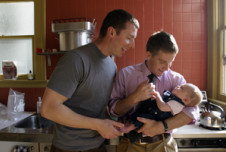The American family’s not what it used to be. In fact, according to the nonpartisan Population Reference Bureau, today only seven percent of all households have a “traditional” arrangement of a breadwinning father married to a homemaking mother, with kids at home—down from 24 percent in 1970.
Is this cause for celebration or dismay? It depends on who you ask. While some have embraced the changing makeup of the American family—from the rise of dual-income households to the emergence of gay and lesbian families—as signs of a healthier and more just society, others claim these changes have harmed parents, children, and American society as a whole.
In this issue of Greater Good, we test both these claims against recent social science data. We wanted to get past all the rhetoric to discover what research says about how the transformation of the American family has impacted all of our lives, especially the well-being of parents and children. Just as importantly, we wanted to reflect these research findings in honest, revealing portraits of typically atypical 21st century families.
Some of the contributors to this issue of Greater Good are famed scholars who have studied the family extensively; others are ordinary people who have seen their own families go through some extensive changes. But what they have in common is a willingness to confront all these changes head-on and seek real solutions to the problems they confront, without waxing nostalgic for family life of the past.
In her lead essay, historian Stephanie Coontz outlines the social and economic changes that have triggered the emergence of new and diverse family forms over the past two generations, and she makes clear that there’s no going back. But she also points to a contemporary paradox: While these recent changes in family life have brought many benefits, they’ve also confronted families with a host of new challenges. Rather than simply criticizing new trends in American society, Coontz argues that we must try to determine how families can best respond to these trends in a way that leverages their strengths and maximizes their well-being.
This is exactly what our other contributors try to accomplish in their essays. Considering the rise of divorce in America, psychotherapist Ruth Bettelheim draws on her own experiences to explain how parents can mitigate the negative effects of divorce while also helping their children develop a valuable set of social and emotional skills. Researchers Ross Parke, Scott Coltrane, and Thomas Schofield show how America’s largest and fastest-growing immigrant group might point the way to new family forms that fuse the best of traditional and modern practices.
Amie Miller surveys the extensive body of research on same-sex families, and discovers that it’s the quality of kids’ relationships at home, not the sexual orientation of their parents, that determines how they’ll turn out. And Greater Good managing editor Jeremy Adam Smith examines how new families today (including his own) are coping with unprecedented social and geographic isolation.
These essays all demonstrate that American families are in a complex period of transition. Old problems, such as inequality, are being replaced by new ones, such as confusion about gender roles for wives and husbands. Yet as our contributors show, it’s not these changes themselves but how we respond to them that will determine how families fare in the 21st century.





Comments